
Susan Kime
We had been to Edinburgh before — ten years ago. It was a rainy stopover. But this time, in the sunny June this year, we resided in the New Town of Edinburgh– but was it NEW? Not at all. Edinburgh’s New Town started construction in the 1700’s. And in contrast, the Old Town, the other part of Edinburgh, began construction in the 7th century AD, with Edinburgh Castle’s foundations laid even earlier, in 500 AD or thereabouts. It further helped define the meaning of OLD in Old Town, as did other pubs and graveyards — including a gravestone in a parking lot, now the final resting place of John Knox, founder of the Scottish Presbyterian Church. Mr. Knox’s resting place was right below parking space #23, near St. Giles’ Cathedral; the parking lot once was a graveyard. He passed in 1572. Tempus Fugits.
But even in New Town, one could not move beyond the meaning of OLD. On Princes Street, through the glorious Princes Gardens, and from most New Town areas, was the ever present view of Edinburgh Castle, a constant reminder of Edinburgh’s ancestral roots. We were part of that ancestry, as back in the mists of time, my great-great-great-great-great grandfather was an Armstrong, part of a lively lowland clan, even with its own Tartan.
In our Edinburgh travels, it was a rare moment when we did not look up to see the ancient visage of Edinburgh Castle, always wondering if our ancestor William Armstrong would approve of why we were in Edinburgh again, to taste the food, to see if we could enjoy Haggis, the national dish of Scotland.
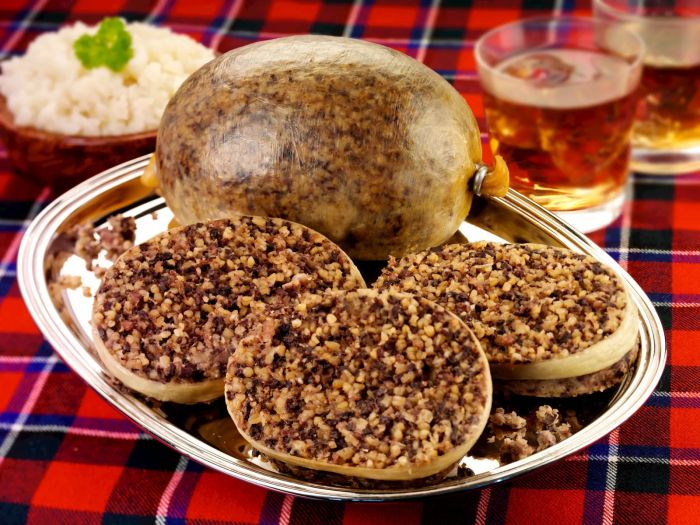
Brittanica – Classic Haggis.
Composed of the liver, heart, and lungs of a sheep, minced and mixed with beef or mutton suet and oatmeal, packed into a sheep’s stomach and boiled, we wondered if we could find it palatable, much less digestible. We hoped there was more to the Scottish taste than this, and there is: we sought, we found. In our two weeks and a day in Edinburgh, we tasted things we had not before. As we resided in New Town, we started there – and searched for the unexpected — and found it —the first experience was a downstairs restaurant called Forage and Chatter, a foraging restaurant. We looked at the menu, and found it engaging, even though we had to discover what sea buckthorn was, and its companion, sea buckthorn ice cream, which was on the menu.
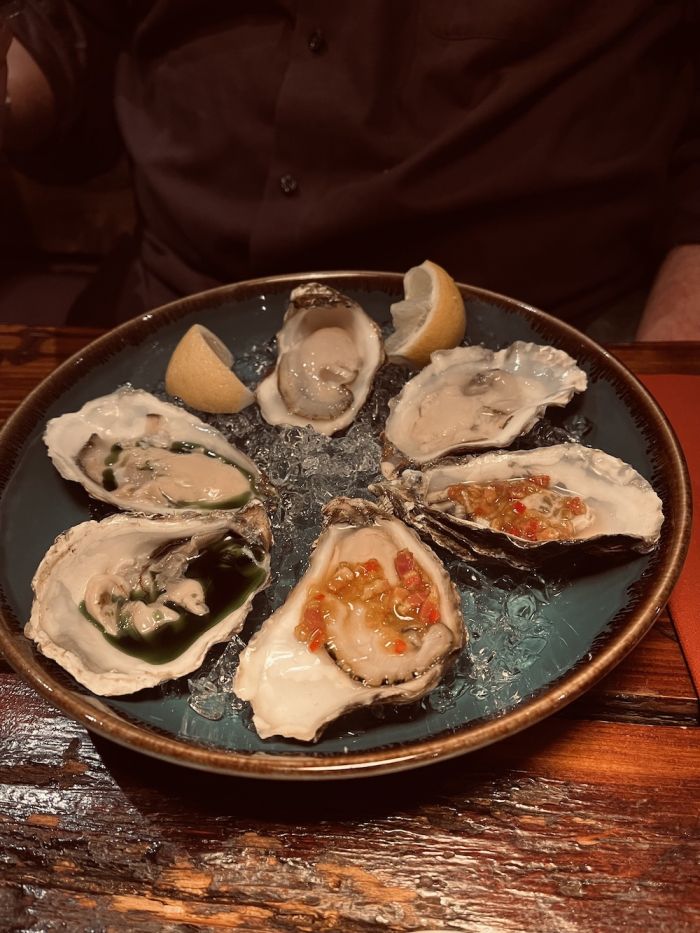
Susan Kime
And, we wanted to know how Blue Murder tasted, as it was on the menu also. It was a native Scottish Blue cheese from Tain, Scotland, named after a famous New Order (UK rock band) song. We did taste it —it was strong, buttery, spicy, and had a slight, bittersweet finish of malt, which we found unusual. Further, we tried the fresh Islay oysters from Loch Gruinart, near Oman, caught that day, flavored with Lemon Dill Oil or Spicy Pancetta. We had both, then sampled the celeriac ravioli, violet Gnocchi, and the Hispi Cabbage, flavored with hazelnut, Lanark White (cheese) and cauliflower, giving the cabbage an unusual tart yet sweet taste.
Because the foraging flavors, contrasting, yet fresh without preservatives, I drank only the still Edinburgh water which has a sweetness that only the purest has. The palate was cleared, and we forged, not foraged, on.
Dishoom — The next day, in culinary opposition in taste, spice, and philosophy to Forage and Chatter is Dishoom, a famous Indian restaurant on Princes Street. As we had been to India before, we were curious as to how the meaty Scottish blended with the spiced Indian vegetarian.
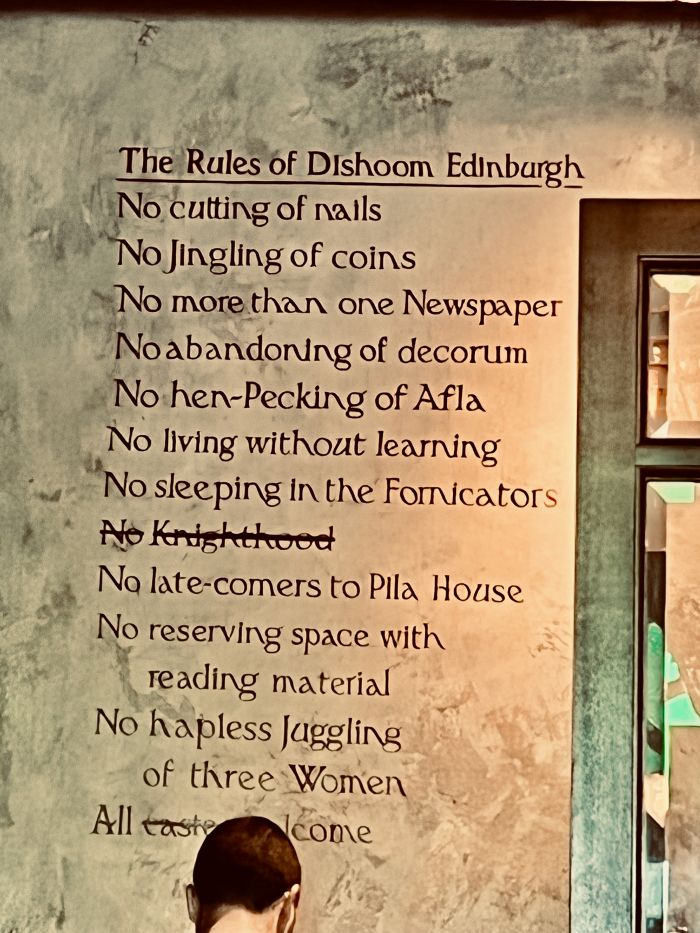
Susan Kime – The Rules of Dining at Dishoom.
Somehow it worked. Dishoom was NOT vegetarian, though on the menu one could have either vegan or vegetarian fare. In the morning, my friend had the Wrestler’s Breakfast, full of sausage, ham, bacon, eggs, beans, all washed down with spicy Masala Chai tea. It was a large spread, and though we are not usually breakfast eaters, we survived with vegetarian samosas, and wonderful Naan and Roti, served hot and blistered, right from their Tandoori and other ovens with more Masala Chai. Dishoom food seems ponderous and spicy, defining the warm dimensional excellence of the South Asia food culture.
But at Dishoom, unlike in other eateries in Scotland or anywhere, was something unusual and memorable: a large wall placard – no doubt from the British Raj period when Britain ruled India, of rules to be followed while eating. Thankfully, we never considered clipping our nails, jingling coins, or abandoning decorum while eating — only three rules out of the many.
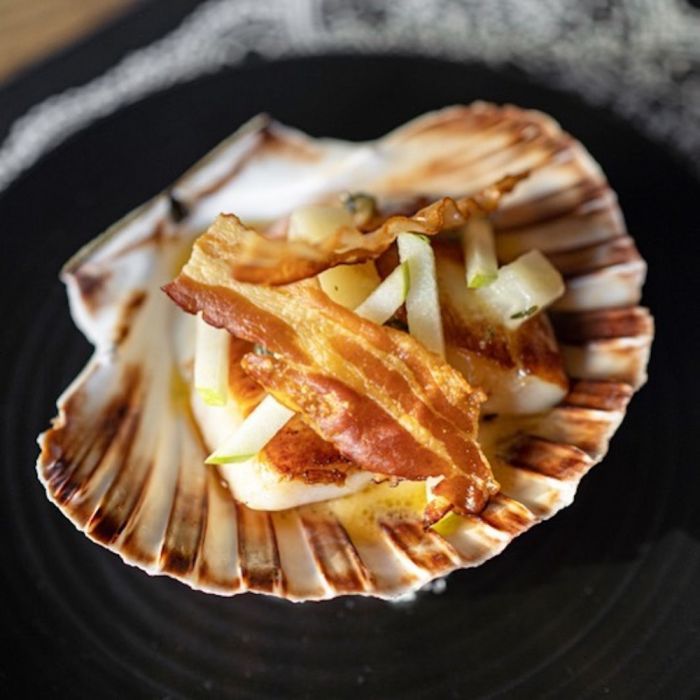
The Scran & Scallie -Isle of Mull Scallops with celeriac, green apple & bacon
The Scran & Scallie — Far afield from Princes Street, in Stockbridge, a small village, and near a river called the Water of Leith, is the renowned Gastro Pub, The Scran & Scallie. It is known to have one of the most creative kitchens in Edinburgh, and it is not surprising, that It had the most, to us, palatable Haggis tasted on this trip –- it tasted like a light liverwurst concoction, tolerable and memorable,
The Scran & Scallie has a varied menu, with plentiful native Scottish/UK items. Three were Lindisfarne Oysters, coming from Lindisfarne, also called Holy Island, a tidal island off the northeast coast of England. We tried them – sweet, fresh, light. They tasted of the sea, not of a bi-valve mollusk. Then, there was Lobster from Newhaven – from the Edinburgh Newhaven fish market founded in the 18th century. Then, when in season, is the Isle of Mull scallops, served with celeriac, green apple & bacon. Then, there were cheeses from IJ Mellis Cheesemongers— a cheese purveyor down the street in Stockbridge, who created cheeses that were unique to our American taste, including cousins to Blue Murder: Hebridean and Lanark Blue Cheese, plus other white and rennet cheeses. Finally, the name Scran and Scallie means fun and food in Scottish slang. Certainly appropriate.
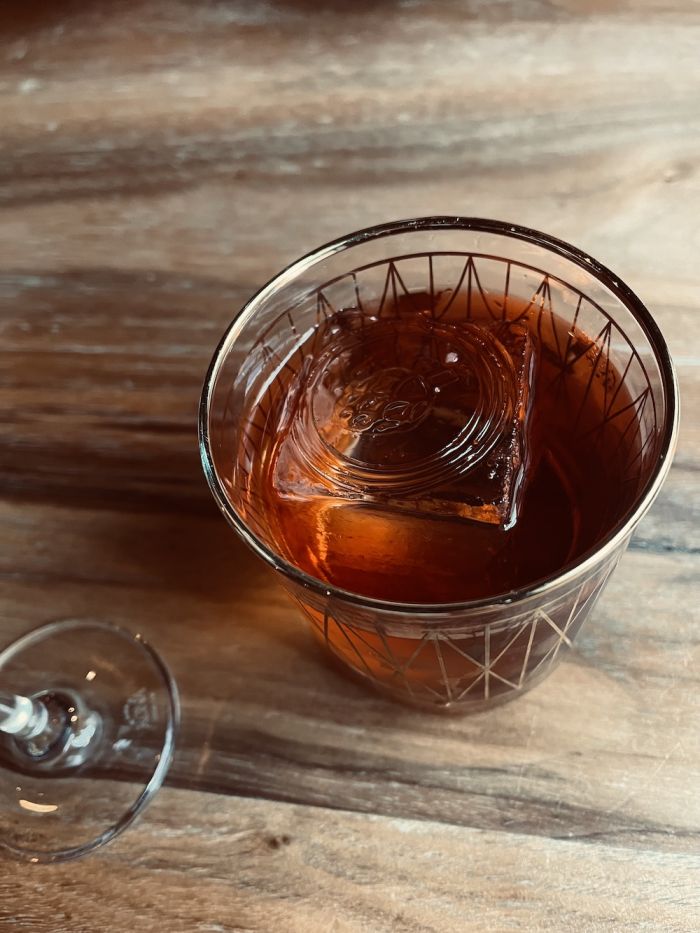
Susan Kime -A Classic Negroni
The Voyage Of Buck: This is another Scottish Gastro Pub, but with a unique history.
William “Buck” Clarence lived in this house 1900 – 1935. Born in 1864, Buck was educated in Edinburgh and at Cambridge. Buck left London and began a tour of India, yet after many global adventures, Buck returned to Scotland in 1900, where he supported music and theatre.
His home became a restaurant, but he is memorialized by its cocktail menu, showcasing the flavors, emotions and people encountered by Buck on his many voyages. Below are only two examples of many.
From Venice:
The Aviation Express: Violet infused Edinburgh Gin, Cocchi Americano vermouth, maraschino, upcycled citrus, with almond perfume
The Chocolate Orange Espresso Martini –Charred orange infused Finlandia vodka, cold brew, dark chocolate, aqua faba.
The Peach and Basil — Sour Mayfield gin, Sipsmith lemon drizzle gin, upcycled citrus, peach and basil purée, aqua faba
From Shanghai
Black Opium Negroni Black poppy seed infused Fords Gin, Campari, Antica Formula, poppy seed liqueur
Shanghai Lily –Blueberry infused Benriach 10 smoky whisky, Buck’s watermelon and coriander cordial, upcycled citrus, aqua faba
It has been said that one must taste the food of a culture to understand it —but one must also be open to new tastes. Remembering such things, we see Scotland with a palatable awareness of the variability of its food, drink, and its commitment of farm to table authenticity.
With such diverse tastes and taste combinations creating even newer taste experiences, each day when in Edinburgh we came to repeat this mantra: we can diet when we get back to the United States– but not in Edinburgh, and certainly not today.
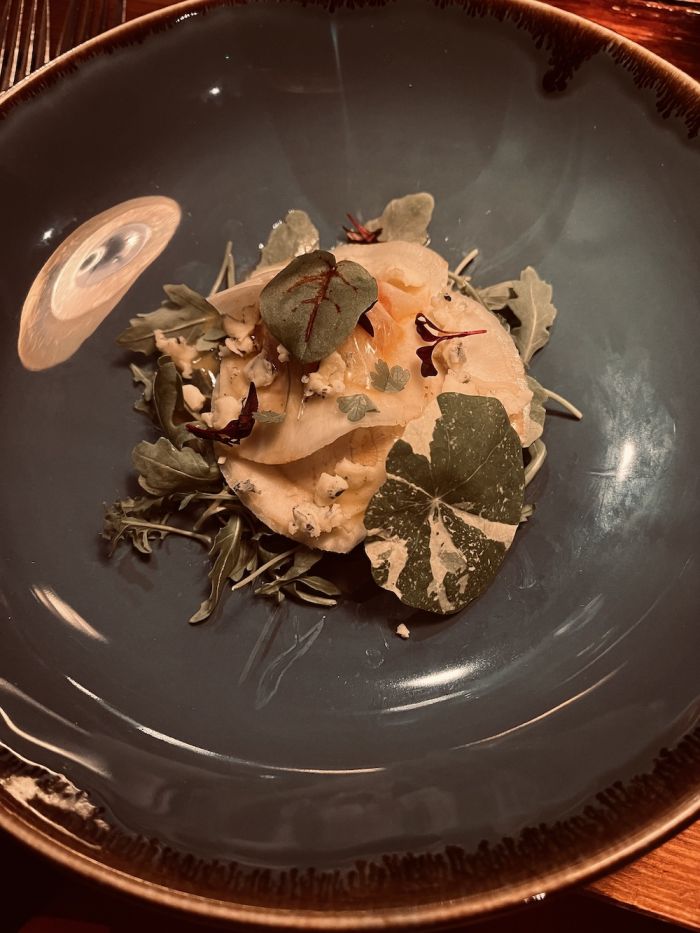
Susan Kime
Herb/Leaf Salad, Forage and Chatter
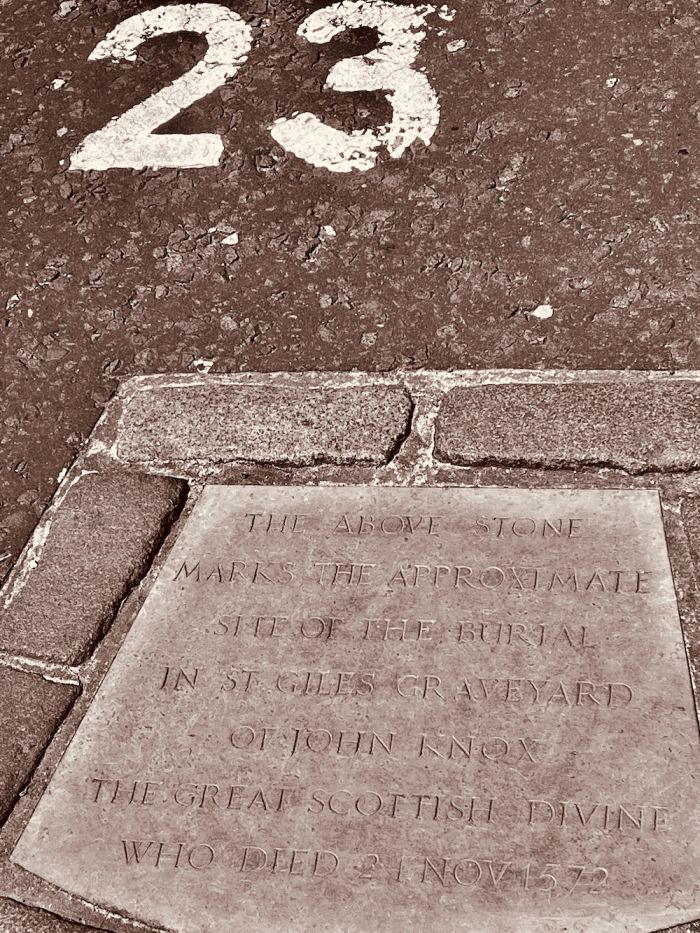
Susan Kime
Parkng Lot Gravestone of John Knox.

